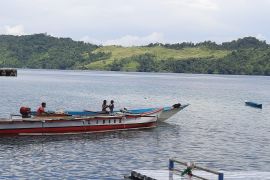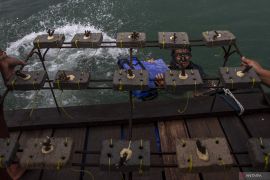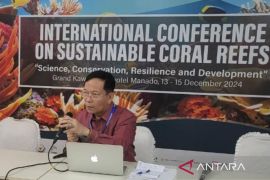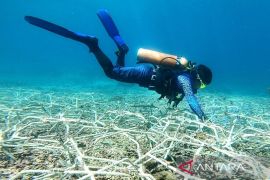Minister of Maritime and Fisheries Affairs, Sharif C.Sutardjo said this in an electronic mail delivered by the head of information and data center Indra Sakti here Friday.
"Saving the Coral Triangle region is important because it is rich in marine biodiversity," the minister said.
At the Forum Rio +20 in late June 2012 Sharif stated that Indonesia was ready and committed to success the Coral Triangle Initiative-Coral Reefs, Fisheries and Food Security (CTI-CFF), a program that made them as a framework on the blue economy concept.
The commitment is important due to the several similarities between CTI-CFF principles with the concept that forwarding approach to biodiversity conservation in favor of the community.
"The blue economy concept focuses on marine and aquatic sector, which also emphasizes a balance between economic development and environmental carrying capacity so as to affect the people welfare," the minister said.
On the other hand a healthy marine ecosystem can support the livelihood of the community, as well as support sustainable economic development.
The implementation of economic concepts in the marine and fishery sector is expected to encourage more balanced economic development between resource utilization and environmental protection efforts.
"In fact it would be a lot of growing economic activity in the marine and fishery sectors," Sharif noted adding that the concept is also expected to change policy orientations and a balance between land and marine based development.
Forum Rio +20 agreed to strengthen the commitment on the implementation of CTI-CGG programs officially written on the Regional Action Plan (RAR) and the National Action Plan (RAN).
The comprehensive action plans in various coastal and marine resource management program were agreements made by six countries when declaring the CTI-CFF regional initiatives in Manado, North Sulawesi 2009.
Rio +20 also emphasized the importance of coastal and marine resource management because the sustainable management could impact on the economic growth, poverty alleviation, food security and adaptation to climate change.
The initiatives determined the aims and regional priority actions to handle the threats on the marine and fishery resources in the coral triangle regions.
The CTI-CFF event was attended by more than 150 scientists, practitioners as well as the official government of the member countries. There were 170 academic papers delivered in the forum.
In the short time Indonesia will participate in the international coral reefs symposium (ICRS) held in Cairns, Australia.
The symposium will discuss coral reef science and technology approach in order to sustainably develop marine and fishery sectors.
The Indonesia government through the minister of marine and fishery will present the coral reef situation in Indonesia.
ICRS is a scientific symposium held for five days and participated in by 2,500 scientists from 80 countries to discuss research and current development of coral reef technologies.
"The scientific research is very important to establish the coral reef resource management policy in all over the world," the minister said.(*)
Editor: Aditia Maruli Radja
Copyright © ANTARA 2012











